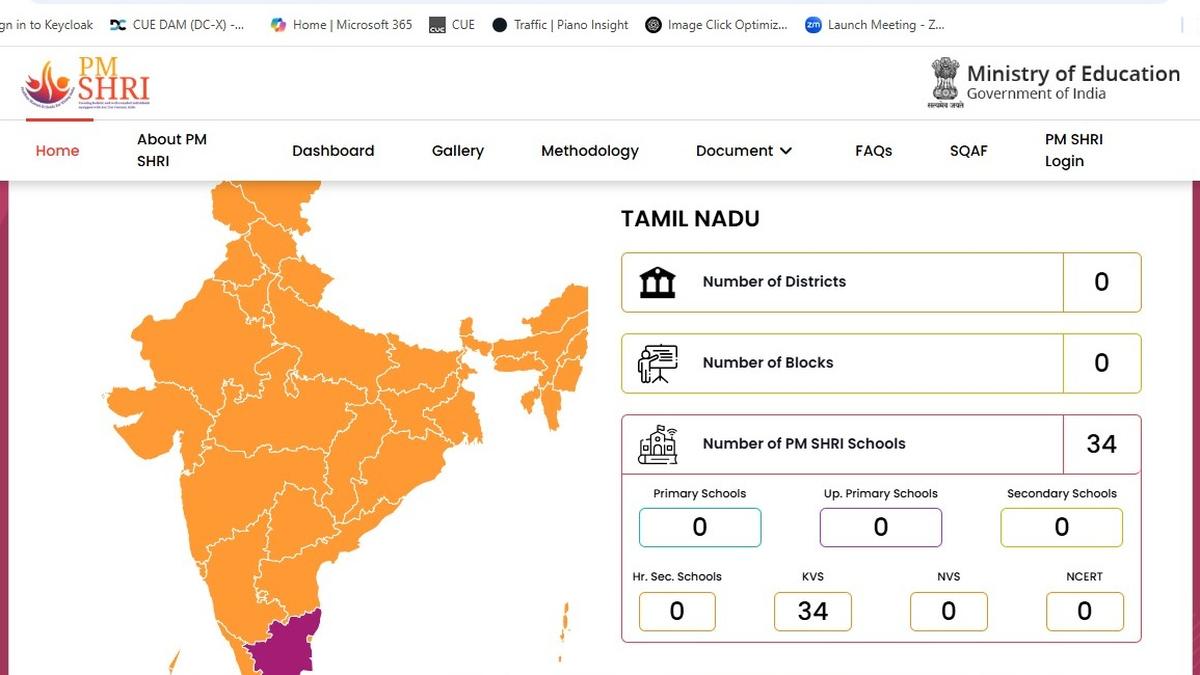Tamil Nadu has a history of opposing “exemplar” school initiatives of Central governments. State governments opposed Rajiv Gandhi’s Navodaya schools. The PM SHRI schools are being opposed now. | Screenshot: Website of https://pmshri.education.gov.in/
The latest exchange of words between Union Minister of Education Dharmendra Pradhan and Tamil Nadu Chief Minister M. K. Stalin and School Education Minister Anbil Mahesh Poyyamozhi has fleshed out deep faultlines in politics.
Controversies rose once again, with the Tamil Nadu State government pressing for the release of nearly ₹2,500 crore in pending funds from the previous financial year and 2024-25 under the Sarva Shiksha Abhiyan. The Tamil Nadu government has said that the non-release of funds is jeopardising critical primary education expenses, including teachers’ salaries.
To this Mr. Pradhan told presspersons a few days ago that SSA funds will not be disbursed to Tamil Nadu unless the State government accepts the National Education Policy 2020 in its entirety. Using the words, “divisive people”, to describe the DMK government, he said: “They cannot think they are above the Constitution. They must accept the NEP in letter and spirit.”
While the NEP is a voluminous document with many different aspects and points of departure, what pertains directly to the SSA funds is the PM Schools for Rising India (PM SHRI) programme. This programme seeks to select schools across India and implement the NEP 2020 in them so they emerge as “exemplar” schools for others. Funded by both the Centre and the States, the schools would receive state-of-the-art facilities for a range of facilities – curricular and co-curricular.
Implementing PM SHRI in Tamil Nadu would mean following the 5+3+3+3+4 system in which there will be two years of early education so students start school at the age of 3. Tamil Nadu follows a different system. While funding for the two early education years may only be welcome, the other point of contention is the three-language policy advocated by the NEP 2020.
The NEP stresses on the importance of learning multiple languages, especially at an early stage that will help in boosting the cognitive skills of children. This is validated by science too.
In a departure from education policies of Congress and UPA governments, the three-language formula advocated by the NEP 2020 says that besides the mother tongue and English, the third language could be any Indian language, not necessarily Hindi.
The NEP says: “There will be a major effort from both the Central and State governments to invest in large numbers of language teachers in all regional languages around the country, and, in particular, for all languages mentioned in the Eighth Schedule of the Constitution of India. States, especially States from different regions of India, may enter into bilateral agreements to hire teachers in large numbers from each other, to satisfy the three-language formula in their respective States, and also to encourage the study of Indian languages across the country. Extensive use of technology will be made for teaching and learning of different languages and to popularize language learning.”
A political hot potato
For the DMK, the term three-language formula indicates Hindi imposition. The DMK’s ideology stands on four pillars: Pride in Tamil as a language and as an ethnic group, reservation in jobs and education for non-brahmin communities, a rejection of Hindi and Sanskrit, and anti-brahminism. Opposing Hindi imposition catapulted it to power originally.
The two-language formula (English-Tamil) is at the core of the DMK’s ideology. It goes back to the founding of the DMK and its predecessor organization. A compromise on the two-language policy would be a near impossibility politically for the DMK. This despite Tamil Nadu government running schools in non-Tamil and non-English mediums such as Telugu, Urdu and so on.
The State had also allowed some schools to teach Hindi instead of Tamil so students could potentially do their entire school education in Tamil Nadu without learning Tamil. This has changed now. Rudimentary Tamil is mandatory among those passing out of school.
The DMK has a history of opposing Central measures to create such selectively funded, “exemplar” schools. The Rajiv Gandhi government sought to create Jawahar Navodaya schools across India that would serve as “model” schools for others.
The Navodaya school scheme demanded that land should be given by the State government, while the Centre would support the rest of the requirements. Tamil Nadu refused to sign on to it since the schools would come under the CBSE system and thereby follow the three-language formula.
The PM SHRI schools slated to come up in every block in the country would follow State syllabus but implement the three-language formula. The choice of the third language would depend on demand from students.
On paper, the demand for a third language could be based on proximity and familiarity. For instance, schools in one State that are near other States could see a demand from parents to learn the language of the neighbouring State. And the NEP advocates one State recruiting teachers from another depending on demand. But Dravidianists argue that a demand for Hindi would be created because the Centre would preferentially treat Hindi knowing students in its other pet schemes such as the Atal Innovation Mission and so on.
In the past, the Congress governments did not make agreeing to Navodaya schools and signing on to the dotted line regarding their NEPs compulsory for the release of education funds. Though measures brought in as legislation, such as the Right To Education Act, were compulsory, NEPs were considered an advisory and a guidance, not a mandate. Mr. Pradhan has emphasised a reversal in Central policy.
While initially showing a willingness to sign the Memorandum of Understanding for setting up PM SHRI schools, the Tamil Nadu government has backtracked over the language issue. Meanwhile, the PM SHRI website says schools from 33 States and Union Territories have signed the MoU. Kerala, Tamil Nadu and West Bengal are missing on the list.
Published – February 18, 2025 10:05 pm IST
